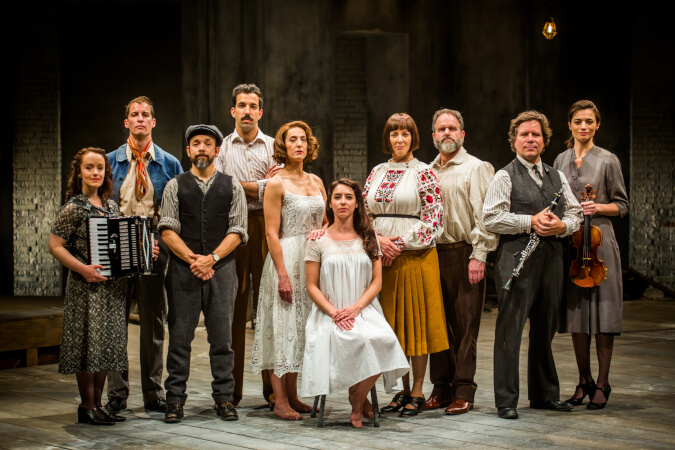At first glance, “Ragtime” sounds and seems like a light-hearted, happy-go-lucky spectacle with incredible music, amusing dance bits and a colorful look into our country back at the turn of the century. But what this Tony-award winning show actually highlights is much deeper than that. “Ragtime” takes place in 1902, back when this country was going through major changes socially, and with change always comes resistance and a bit of controversy— ironically with many issues that still ring true in today’s society. The Arden Theatre’s take on the popular production holds on to the innate themes and polarizing message, while still showcasing incredible musicality and clarity with stripped down and straightforward showmanship. Jim Hogan, who plays Father in the show sat down with Metro to give the scoop on the Arden’s unique view of the show, dive into what to expect from the incredible score and also chat about why in today’s world “Ragtime” is more relevant than ever.
How did you first get on board with “Ragtime”?
I’ve been doing musical theater for almost ten years professionally and I grew up in Suburban Philadelphia in Montgomery County, so I’ve been familiar with this theater world in Philly for a while. I actually made my Actor’s Equity debut—which is the union for actors—at the Arden back in 2013 and they asked me to come and audition for “Ragtime” back in April or so, and it just seemed like a good fit—I’m really lucky to be a part of it.
Can you tell me a little bit more about your role as Father in the show and also how you’re preparing?
Father is a really interesting guy—-he’s got a lot of layers to him. He’s a family man with a very successful business at the turn of the century. Our play takes place in 1902, so we’re discovering a lot of change in the United States, and Father is the character who I would say is struggling to adapt to these changes the most. Father also loves to explore, he does it sort of as a hobby. He takes a trip at the beginning of the show and we see him leave and he comes back many months later to find that his family has changed quite a bit from the way that they were since he left. We see this struggle of him adapting to change from start to finish and how he tries to adapt to what he would say are radical changes with not only his family or town, but also with the country as a whole. So it’s been interesting to kind of dive into who he is when I myself am such a liberal and a person who seeks change and is eager for the next big thing. But you know, what is most important to me about Father is that he is not portrayed as a villain, he just doesn’t understand. He feels like he’s a person who always has to be on top of certain things, so I’m trying to discover what I can bring to the table with Father just outside of the stereotypical villain view and try to make him as real of a person as I possibly can.
What do you think makes this show relevant still in today’s climate?
I think if there was ever a time that it would be the most relevant, it would be now. We are in such an interesting political climate, and a lot of the themes that we are dealing with in this musical are exactly some of the themes we are seeing in current events. The show has such a central theme of prejudice and racism and anti-Semitism— all of these really dark scenes accompanied by probably my favorite score ever written for a Broadway stage. It’s very, very powerful stuff. We have violence, prejudice against races, vandalism and all of these things that we have seen recently. There are so many things in this show that go hand and hand with what is going on with our country right now.
Just switching gears now, you mentioned the incredible score—can you tell me a little more about the music in the show?
What’s interesting about “Ragtime” is that this show feels to me as one of the last spectacle musicals in the repertoire of American musical theater, when you have things like “Les Miserables,” “Phantom of the Opera” or “Miss Saigon”— the score for “Ragtime” is very similar though. It’s very large and sweeping and symphonic in nature. We also have a very unique concept and view with this show, we are taking these large themes and making them more apparent [than ever] to the viewers. So we have less actors, less musicians and we are really taking a magnifying glass up to what “Ragtime” has been in the past and how we can make it more clear. For example, I do play Father, but you’ll also see me play the piano up on stage accompanying various actors for their songs. In our cast of about 18, I would say that at least 9 or 10 actors play their own instruments at various points during the show in an effort to help tell the story for other actors who are taking the spotlight at that time. So it’s definitely a different take on what the show has been originally— it’s been a lot of fun, and I’m excited about it.
Is there a particular scene or song that stands out to you the most?
For me at this moment, it’s a song in Act I called ‘New Music.’ It kind of takes almost everyone who is a major character in the show and puts them together in one space for the first time. We see all of these characters’ story lines converge— and in addition to that, the song is just so incredibly powerful. It’s a very large turning point in our show and also just a beautiful moment musically. It’s definitely something to look forward too.
Overall what do you hope audiences take away from the show?
Honestly, I hope that they will take a look at themselves. I hope that everyone will see what we’ve given and kind of look into a mirror and see what kind of person they are or have been, or what they want to be in the future because I think there is a lot of great stuff to be learned from this story. So I hope people will walk away having had a great night of entertainment and also with some reflection because I think that’s what this time is all about.
Catch “Ragtime” onstage at the Arden Theatre Company (40 N 2nd St.) from Sept. 19-Oct. 20. To learn more about the Arden or to purchase tickets, visit ardentheatre.org.































